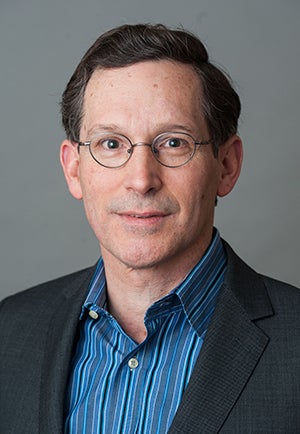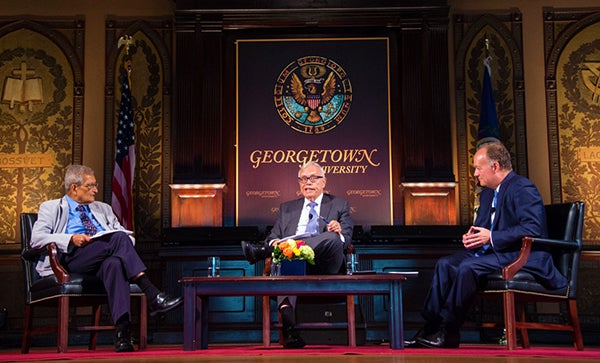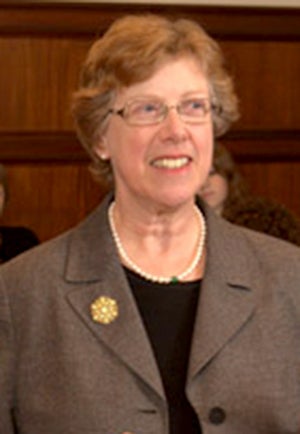Title: International Conference Looks at Gaps, Challenges in Human Development
A week before Pope Francis made his first visit to America, hundreds of philosophers, economists, social scientists and development practitioners from nearly 50 countries gathered at Georgetown to address how to enable the world’s most poor and vulnerable to live better lives.
About 450 participants attended the 13th annual conference of the Human Development and Capability Association (HDCA), led by Georgetown philosophy professor Henry Richardson.

Henry Richardson
The association comprises a global community that focuses on people-centered development and promotes research and policy in the areas of human development and well-being.
To Do and To Be
Organized by Georgetown and HDCA, the Sept. 10-13 conference featured James Heckman, a Nobel Prize-winning economist; Ernesto Zedillo, the former President of Mexico; and philosopher Seyla Benhabib.
The founders of the so-called “capabilities approach” – Amartya Sen, another Nobel Prize-winning economist, and American philosopher Martha Nussbaum – were also among the major speakers at the conference.
“The capability approach defines and assesses social and economic progress on the basis of what people are able to do and to be, leaving it to individuals to decide which of their capabilities they will take advantage of,” says Richardson, HDCA president. “Human development so understood thus centers on a kind of freedom.”
Human Flourishing
Nobel Prize-winning economists Amartya Sen, left, and James Heckman, center, discuss the importance of global human development with Georgetown President John J. DeGioia during the 2015 Human Development and Capabilities Conference in Gaston Hall.
The conference featured research and case studies across disciplines, demonstrating the many dimensions of what it means to live flourishing lives and how that can be measured by means other than a country’s GDP.
“It is a shared commitment to the animating spirit of the HDCA,” Georgetown President John J. DeGioia said in his opening remarks, “[which embraces] a more nuanced and inclusive view of human flourishing … that brings us together for this conference.”
“Georgetown has a long history of engagement with the study and practice of human development,” he said. “A distinctive approach, deeply rooted in our Catholic and Jesuit tradition and beginning with the conviction that every human life possesses an inherent dignity, characterizes all of our work.”
Human Development Programs
The university’s efforts in this area are being strengthened by graduate programs created in recent years – a Master’s Program in Global Human Development, a Master’s in International Development Policy and a Master’s of Science in Global Health.
“We are strengthening our efforts to prepare students to be thoughtful leaders who promote human flourishing in the fullest sense,” DeGioia said.
Social Interventions
The HDCA conference theme this year was “Capabilities on the Move: Mobility and Aspirations.”
Heckman, who shared the 2000 Nobel Prize in Economics for his work on socioeconomic mobility, noted at the conference that gaps in skills between advantaged and disadvantaged people start very early in life but could be reversed with intervention.
“We’ve come to understand that if society intervenes early enough, and in a consistent enough fashion over the lifecycle of a child, it will promote, cognitive, social, emotional ability as well as health,” said Heckman, who directs the Center for the Economics of Human Developmentat the University of Chicago.
Capability and Inclusiveness
Following Heckman’s remarks, Sen, a Harvard professor of economics and philosophy who won the same prize in 1998, conversed with Heckman and DeGioia on stage.
“Capability is not only holistic, it’s analytic as well,” Sen said. “It’s analytical and inclusive. I think that if the subject (of capability) is to remain alive, I think it has to have that feature of inclusiveness.”
Among the many sessions over the three-day conference was a conversation between Richardson and Georgetown economics professor Martin Ravallion on what it means in practice to make a commitment that the world’s poorest not be left behind.
Another session focused on a versatile new method of measuring multi-dimensional deprivation chaired by Kaushik Basu, chief economist of the World Bank and a former president of the HDCA.
Slums and Refugees
Bernhard Liese, chair of the international health department at the School of Nursing & Health Studies, facilitated a discussion between a faith-based group working in a slum in Accra, Ghana, and Accra’s city manager.

Susan Martin
Susan Martin, chair of the conference’s program committee and director of Georgetown’s Institute for the Study of International Migration, chaired a session on forced migration and human development.
She said the current refugee crisis in Europe and the Middle East served as a backdrop to many of the conference discussions on human development and migration.
“When people cannot exercise their right to education, livelihoods, shelter, health and other fundamentals of human development, they often have little choice but to risk their lives to seek greater security and well-being, as we are seeing in Europe today,” Martin said.
Enhancing Justice
Richardson said HDCA’s annual meetings have a “unique vibrancy.”
“Nowhere else can you find philosophers, economists, social scientists and development practitioners so productively united in a commitment to social progress, especially for the world’s most deprived people,” he said. “We want to know if policies involving human development enhance justice and truly enable people to live better lives, and we do not shy away from the deepest questions of justice and value. This is just the kind of engaged reflection that is central to Georgetown’s Jesuit tradition.”